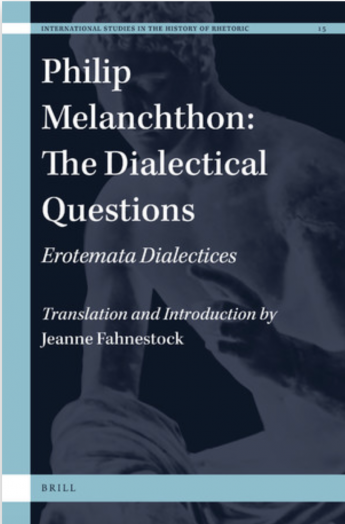Jeanne Fahnestock
Jeanne Fahnestock published The Routledge Handbook of Language and Persuasion (an edited collection with Randy Allen Harris), in 2023, and in 2021, The Dialectical Questions, a Translation and Introduction to Philip Melanchthon’s sixteenth-century Erotemata Dialectices, a key text in the “rhetorical history” of science. She is the author of Rhetorical Style: The Uses of Language in Persuasion (2011; winner of the Rhetoric Society of America’s Outstanding Book Award), Rhetorical Figures in Science (1999/2002), and co-author with Marie Secor of A Rhetoric of Argument (3rd edition, 2004). She is currently finishing a textbook on Effective Style: Writing in the Age of AI. She has published articles and chapters on rhetorical theory, argument, language analysis, the rhetoric of science, scientific accommodation, and Victorian fiction. Fahnestock is a Fellow of the Rhetoric Society of America (co-organizing its conference in 2000), and has served on the Council of the International Society for the History of Rhetoric. In 2012she was the recipient of the campus’s “Excellence in Teaching” award from the Center for Teaching Excellence. In 2010, she received the Distinguished Scholarship Award for Lifetime Achievement from the International Society for the Study of Argumentation. Fahnestock's interests center on form/argument connections and the status of rhetoric in the disciplines, especially in the sciences. Her current projects include articles on the language of description, the “rhetorical control” of novel imaging techniques in the sciences, and current controversies over scientific standards of argument. At Maryland, Fahnestock directed the Professional Writing Program and the Academic Writing Program for a total of twelve years, and received the Outstanding Administrator Award from the Maryland Association of Higher Education in 1994. She served on the Task Force revising the University’s Core Curriculum in 2009-2010.
Publications
Philip Melanchthon: The Dialectical Questions. Erotemata Dialectices
Introduction and Translation. Leiden: Brill. 2021. 559pp.
Author/Lead: Jeanne FahnestockThe Dialectical Questions offers an English translation of the Erotemata Dialectices, the final and fullest textbook on the art of
argumentation written by the reformer and educational innovator
Philip Melanchthon (1497-1560). Representing an era when rhetoric
and dialectic were seen as interdependent, companion arts,
Melanchthon’s textbook was widely used in Protestant Latin
schools and universities during the Reformation. The translation
tracks revisions to the text across its lifetime editions (1547-1560)
and traces its classical sources. The introduction chronicles the
personal and political upheavals that Melanchthon experienced
during its composition, and provides an overview of its rich and
complex content. It then focuses on the unique feature that sets
this work apart from other early modern dialectics: its many
sample arguments drawn from medicine and natural philosophy.
Rhetorical Style: The Uses of Language in Persuasion
A comprehensive guide to the language of argument, Rhetorical Style offers a renewed appreciation of the persuasive power of the English language.
Author/Lead: Jeanne FahnestockA comprehensive guide to the language of argument, Rhetorical Style offers a renewed appreciation of the persuasive power of the English language. Drawing on key texts from the rhetorical tradition, as well as on newer approaches from linguistics and literary stylistics, Fahnestock demonstrates how word choice, sentence form, and passage construction can combine to create effective spoken and written arguments. With examples from political speeches, non-fiction works, and newspaper reports, Rhetorical Style surveys the arguer's options at the word, sentence, interactive, and passage levels, and illustrates the enduring usefulness of rhetorical stylistics in analyzing and constructing arguments.
Read More about Rhetorical Style: The Uses of Language in Persuasion
A Rhetoric of Argument, 3rd Edition
When it was first published in 1982, A Rhetoric of Argument developed a ground-breaking new approach to teaching argument.
Author/Lead: Jeanne FahnestockWhen it was first published in 1982, A Rhetoric of Argument developed a ground-breaking new approach to teaching argument. The "stasis approach" pioneered by Fahnestock and Secor distinguished among the four basic questions that arguments are written to answer: What is it? (Definition arguments); How did it get that way? (Causal arguments); Is it good or bad? (Evaluation arguments); What should we do about it? (Proposal arguments). These four questions, now standard in many argument texts, give students a constructive, engaging way to analyze readings by other writers and to construct their own arguments.
Rhetorical Figures in Science
Fahnestock breaks new ground in the rhetorical study of scientific argument as the first book to demonstrate how figures of speech other than metaphor have been used to accomplish key conceptual moves in scientific texts.
Author/Lead: Jeanne FahnestockFahnestock breaks new ground in the rhetorical study of scientific argument as the first book to demonstrate how figures of speech other than metaphor have been used to accomplish key conceptual moves in scientific texts. Examples, both verbal and visual, range across disciplines and centuries to reaffirm the positive value of these once widely-taught devices.



